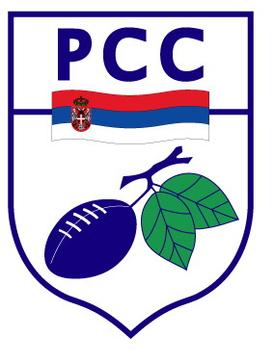
Serbia and Montenegro, known until 2003 as the Federal Republic of Yugoslavia, FR Yugoslavia or simply Yugoslavia, was a country in Southeast Europe located in the Balkans that existed from 1992 to 2006, following the breakup of the Socialist Federal Republic of Yugoslavia. The country bordered Hungary to the north, Romania to the northeast, Bulgaria to the southeast, Macedonia to the south, Croatia and Bosnia and Herzegovina to the west, and Albania to the southwest. The state was founded on 27 April 1992 as a federation comprising the Republic of Serbia and the Republic of Montenegro. In February 2003, it was transformed from a federal republic to a political union until Montenegro seceded from the union in June 2006, leading to the full independence of both Serbia and Montenegro.

Jugoslovensko sportsko društvo Partizan, commonly abbreviated as JSD Partizan, is a multi-sport club from Belgrade, Serbia. Founded on 4 October 1945, it is an umbrella organization featuring 30 clubs in 30 different sports.

Nenad Zimonjić is a Serbian professional tennis player who was ranked world No. 1 in doubles.
The Yugoslav First Federal Football League, was the premier football league in the Kingdom of Yugoslavia (1918–1941) and Socialist Federal Republic of Yugoslavia (1945–1992).

The Serbia national football team represents Serbia in men's international football competition. It is controlled by the Football Association of Serbia, the governing body for football in Serbia.
The Yugoslav Cup, officially known between 1923 and 1940 as the King Alexander Cup (Serbo-Croatian: Kup kralja Aleksandra, Куп краља Александра, and between 1947 and 1991 as the Marshal Tito Cup, was one of two major football competitions in Yugoslavia, the other one being the Yugoslav League Championship. The Yugoslav Cup took place after the league championships when every competitive league in Yugoslavia had finished, in order to determine which teams are ranked as their corresponding seeds. The Marshal Tito Cup trophy was based on a design by Branko Šotra.

Basketball at the Summer Olympics has been a sport for men consistently since 1936. Prior to its inclusion as a medal sport, basketball was held as a demonstration event in 1904. Women's basketball made its debut in the Summer Olympics in 1976. FIBA organizes both the men's and women's FIBA World Olympic Qualifying Tournaments and the Summer Olympics basketball tournaments, which are sanctioned by the IOC.
The Serbia and Montenegro national football team was a national football team that represented the State Union of Serbia and Montenegro. It was controlled by the Football Association of Serbia and Montenegro. For 11 years, it was known as the FR Yugoslavia national football team when the state was called the Federal Republic of Yugoslavia, until February 2003, when the name of the country was changed to Serbia and Montenegro. In 2006, Montenegro declared its independence from Serbia, with the result that the country's football team was renamed as the Serbia national football team on 28 June 2006 with the Montenegro national football team created to represent the renewed state of Montenegro.

The Serbia men's national basketball team represents Serbia in international basketball competition and is controlled by the Basketball Federation of Serbia. Serbia is currently ranked sixth in the FIBA World Ranking.
The Serbia and Montenegro men's national basketball team also widely known as the FR Yugoslavia men's national basketball team, represented Serbia and Montenegro in international basketball competition, from 1993 to 2006. It was governed by the Basketball Federation of Serbia and Montenegro.

FK Rudar Pljevlja, commonly known as Rudar Pljevlja or simply Rudar, is a football club based in Pljevlja, Montenegro. It currently plays in the Montenegrin First League, the country's highest tier.

The Serbia national rugby union team is classified as a tier three nation by World Rugby, and has yet to qualify for the Rugby World Cup. They have played over 100 internationals.
The Yugoslavia men's national tennis team competed from 1927 to 2003 and represented the Kingdom of Yugoslavia from 1927 to 1939, the Socialist Federal Republic of Yugoslavia from 1946 to 1992, and the Federal Republic of Yugoslavia from 1995 to 2003. It was organised by the Yugoslav Tennis Association. Following the breakup of Yugoslavia in the 1990s, separate teams were created for the new nations which split apart from Yugoslavia:
The Montenegro Davis Cup team represents Montenegro in Davis Cup tennis competition and are governed by the Tennis Federation of Montenegro.
The Serbian Billie Jean King Cup team represents Serbia in Billie Jean King Cup tennis competition and are governed by the Tennis Federation of Serbia. They will compete in 2019 Fed Cup Europe/Africa Zone Group I at Venue 1 in Bath, United Kingdom. From 5 June 2006 team is playing under the name of Serbia.
The Montenegro Billie Jean King Cup team represents Montenegro in the Billie Jean King Cup tennis competition and are governed by the Tennis Federation of Montenegro. They currently compete in the Europe/Africa Zone of Group III.
ŽFK Mašinac PZP is a women's football club based in Niš, Serbia. The club was the most successful women's football club of SFR Yugoslavia, FR Yugoslavia and Serbia. They play at Mašinac Stadium, in Delijski Vis neighborhood in Niš.

The Serbia and Montenegro men's national water polo team, also widely known as the FR Yugoslavia men's national water polo team, represented Serbia and Montenegro in international water polo games, from 1993 to 2006. It was governed by the Water Polo Association of FR Yugoslavia (1992–2003), then the Water Polo Association of Serbia and Montenegro (2003–2006). The team won medals in the Olympics, World and European Championships, FINA World Cup, FINA World League, Mediterranean Games and Universiade.
The Basketball Federation of Serbia and Montenegro, previously Basketball Federation of Yugoslavia, was a non-profit organization and the national sports governing body for basketball in Serbia and Montenegro. Federal Republic of Yugoslavia renamed to Serbia and Montenegro in 2003. Until 2006, the organization has represented Serbia and Montenegro in FIBA and the men's and women's national basketball teams in the Olympic Committee of Serbia and Montenegro.







